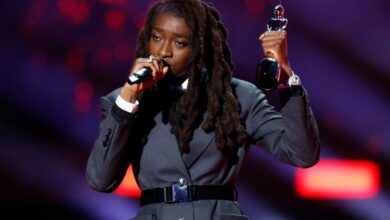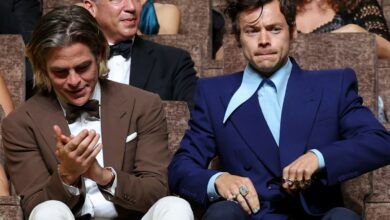Young Fathers: ‘It’s a terrible time for music on this island – even more so if you don’t have a trust fund’

How does it feel getting shortlisted for the Mercury Prize for a second time?” repeats Young Fathers’ Kayus Bankole, mulling the question over in his mind. “Ahhhmm. It feels like an acknowledgement that we’re no longer a flash-in-the-pan band.” His bandmate, Alloysious Massaquoi nods slowly. “Yeah. A solidifying moment. It’s all good…”
Joining me – via patchy Zoom links from different locations, while their third member, Graham “G” Hastings, has gone awol – the “Liberian/Nigerian/Scottish psychedelic hip-hop electro boy band” appear only mildly more enthusiastic than they had been back in 2014, when they were awarded the prize for their debut album Dead. “What do you expect us to be doing, jumping around?” they shrugged at reporters at the time, arguing that the £20,000 award and attendant flurry of industry attention “doesn’t change anything at all”.
Almost a decade on, the three musicians remain – in conversation at least – far from Tiggerish. Their serious tones and cautious words are still at odds with their gloriously noisy, soulful and unpredictable music – on display most recently on their fourth album Heavy Heavy, for which they’ve received this second Mercury nod. Bouncing, prowling, gyrating and ululating, the Edinburgh-based trio (who all share vocal and instrumental duties) delivered one of the most exciting and impassioned sets at this year’s Glastonbury festival. During a fierce performance of Heavy Heavy’s lead single, “I Saw”, Banjole, Black and dreadlocked, pressed himself up against Hastings, white and flushed; their bodies as close as their vocals. Massaquoi, meanwhile, repeated a line from their older song “Cocoa Sugar”: “Mainstream negroes that look like Jesus…” Towards the end of their set, Hastings led the crowd in a chant: “Say it loud! Say it clear! Refugees are welcome here!” before shouting “F*** the Tories” and dedicating their breakthrough single, “Shame”, to home secretary Suella Braverman.
When I ask Hastings – later, by email after his phone signal finally gives out – if this political statement was planned in advance, I get a one word answer: “No.” But Young Fathers, a band who bring African sounds and global themes into their music, are political by nature. They, themselves, acknowledge this – on a purely visual level, at least. “Being a multiracial band is a political statement in itself,” says Massaquoi. “We’re outsiders, pushing against the grain, making a worldwide sound in a cold part of Europe where we just happen to have met.”
The 35-year-old Massaquoi was born in Liberia and arrived in Edinburgh as a child refugee, aged four, fleeing his West African nation’s civil war. Bankole (the son of Nigerian immigrants) and Hastings were both born in Edinburgh, but have no interest in being identified with the happenstance of their nationality. The three met on the dance floor at a sweaty hip-hop club when they were 14 years old. Soon they were holed up at Hastings’ house, a bundle of limbs folded into his wardrobe with a karaoke mic, making their own sounds. Their physical and vocal intimacy was built-in from the start (both Dead and Heavy Heavy were recorded in small basement spaces) and the “challenging but liberating” thrill of their music comes from a friendship that makes space for emotional vulnerability and regular disagreement – most of which gets packed into the tracks because, as Hastings tells me, they fear “spoiling the music with talk”.
“We don’t agree a lot,” says Massaquoi. “We bring different things as individuals, in terms of trials and tribulations, our joys. Our tastes are different, but we lock onto something together, finding the hooks in the light and dark… each of us is the missing link the others need to make this beast work.” He says that while their bond is “almost telepathic”, the challenge lies in “how much we want to surprise each other”.
“We used to do rap battles. We would do three-minute pop songs. Dance music. That really sets the tone for us,” continues Massaquoi. “But we get bored easily,” chips in Bankole (who now has us on speakerphone as he drives through Ireland). “So eventually we realised we wanted to do something more courageous within that format of three guys writing songs,” Massaquoi agrees.
Over their 20 years together, Bankole says they have recorded in every physical environment and genre they can imagine, “always searching for that sense of childlike glee”. It makes sense then, that Heavy Heavy was inspired by photographs and videos of people dancing. “That communal energy… people moving, unadorned,” muses Massaquoi, adding that much of the record was recorded on their phones. “We had lots of toys lined up that we could pick up and play with or hit at any point.”
Bankole had brought several instruments back from his trip to Africa: talking drums, a couple of shakers, “voice note samples of kids crying”. But, he says, “Nothing starts until we are all together in the studio. There needs to be a level of uncertainty and insecurity within that space where we’re telling stories, putting together words that rhyme. We need to be thinking: what if it never happens? The risk pushes, elevates the moment until it grows arms and legs and becomes an entity.”
Back in February, when the album was released, Hastings spoke of the band tapping into “ancient” streams of drone and ritual. And so Heavy Heavy nods to Aboriginal and Celtic sounds: sacred, soothing and stripped to a raw, stone and wood pulse. The multi-textured meshing of the trio’s voices feels timeless. Hasting now tells me, “That’s what gets me, because I remember them happening out of pure instinct and confidence. The accidents feel emotional to me.”
Before his phone also fizzles out of range, Bankole sounds most animated discussing the song “Be Your Lady” on which the band flip gender as they had done race with previous album title White Men are Black Men Too (2015). “Show me your ruin tonight,” goes “Be Your Lady”. “I won’t move when you fight, I’m the loser you like/ Don’t need to wallow in pride…I wanna be your lady/ Forgetting I’m the man.” Although the themes have real weight, Massaquoi stresses how they wanted the album to feel playful. “That’s why we called the record Heavy Heavy… saying it twice takes the edge off.” And while their sound comes with “a consciousness of what’s happening in the world, it’s never going to be finger-wagging. We want to do that in a way that’s subversive but has hooks. Some of those Motown artists did that. And Bob Marley? Political as hell. They still get the message across and that’s the magic.”
Bankole says he wants Young Fathers to be writing hooks that are “up there with Beyoncé”. But – in testament to the trio’s differing attitudes – when I email Hastings to ask if he thinks Beyoncé-esque hooks are possible for such an alternative band, he replies: “I don’t want it to be possible. Looks like a nightmare. But that difference between [Bankole and I] is what makes it what it is. It’s not a problem.” The tersest of the three men, Hastings does concede that he is warming to the world of prizes and publicity. He admits to enjoying “describing the music more” and acknowledges that showbiz can be as much about “the shiny shoes” as the scuffed sounds.
Young Fathers are certainly hungrier for the prize this time around. Though they once felt it would change nothing, Massaquoi now admits that winning the award did bring their music to a wider audience. “We’ve managed to maintain a spartan attitude and chipped away,” says Hastings. “It’s also a terrible time for music and bands on this island in terms of how almost impossible it is to keep going. Especially when it’s outside the same old and even more so if you don’t have a trust fund to back you up.”
The 2023 Mercury Prize awards will take place on Thursday 7 September at the Eventim Apollo, Hammersmith
Our music is never going to be finger-wagging





